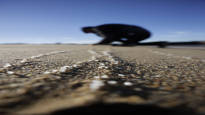According to the management of Galicia, the Spanish central government was silent about the leak for weeks, reports The Guardian, among others.
The authorities in northern Spain have sounded the alarm, because the millions of plastic pellets that escaped from a cargo ship off Portugal in December have started to land in Spain, says a British newspaper The Guardian.
State prosecutors have also opened an investigation after receiving information that the pellets may be toxic.
The Toconao, a Liberian-registered vessel chartered by the shipping company Maersk, lost six containers on December 8 when it was about 80 kilometers off the coast of Portugal. One container contained a thousand 25-kilogram sacks of small balls, which are used in the production of plastic products.
Millions of pellets have washed ashore in northwestern Spain. Regional employees and volunteers clean the areas.
On Tuesday, the autonomous regions of Galicia and Asturias issued Level 2 alerts, allowing even more people to be assigned to cleanup work. With the alerts, the regions also receive help from the Spanish Ministry of Environment and Transport.
Regional Director of Galicia Alfonso Rueda according to hundreds of sacks have not yet reached the shore.
– Now is the time to collect them, or at least try to, he commented.
The case has led to a dispute between the conservative leadership of Galicia and the socialist-led central government. Rueda has said the central government knew about the escaped pellets for two weeks before informing the Galician leadership on January 4.
Spanish Minister of the Environment Teresa Ribera said earlier that the government is ready to help as soon as help is requested.
Galicians will vote in regional elections in February.
Environmental organizations demand a quick response. They have compared the situation to the sinking of the Prestige oil tanker twenty years ago, which was initially reacted to mainly with confusion and the coordination between the regional administration and central management was lame.
the European Commission warned about the dangers of plastic pellets three months ago.
– Plastic particles do not break down in the environment and cannot be removed. They accumulate in animals, fish and shellfish. People get them from food, the commission commented in October.
AP, AFP
